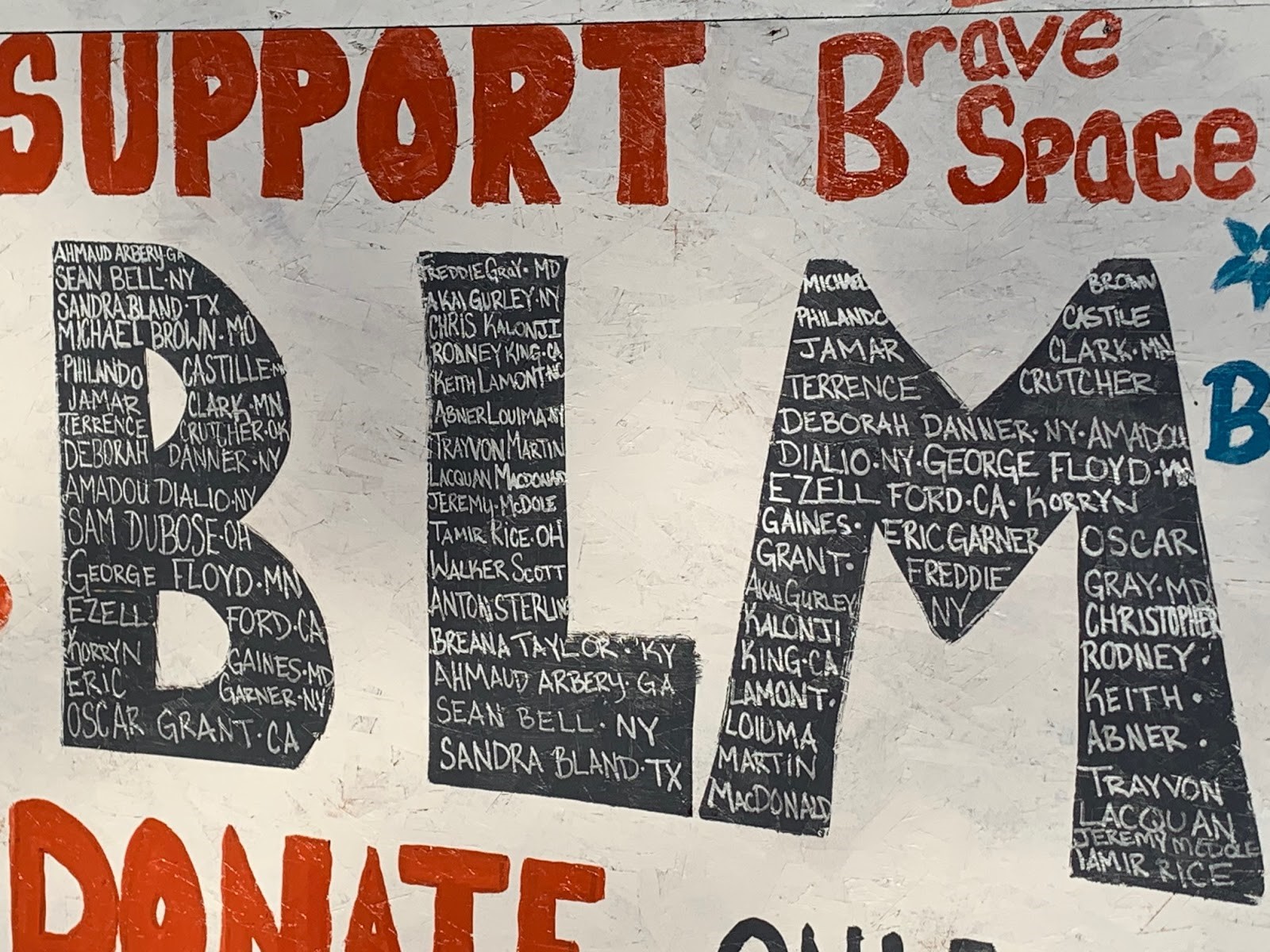Physically Distanced but Spiritually Connected
The Power of Naming

There are cardboard signs, yard signs, painted signs on store and restaurant windows, signs as large wall murals, printed signs in the rear windows of cars, signs on tee shirts and bumper stickers, signs as art installations on plywood. Signs are everywhere, using whatever materials are available. They are signs that are not going away, signs that ask us while moving forward to name with clarity, courage, and commitment.
Dear Maryfield,
One of the powerful slogans that has persisted among thousands and thousands of demonstrators these last two and a half weeks since the death of George Floyd is “Say his name.” Acknowledge the specificity of who he was, of who has been lost, of where injustice has lodged. One of the subtexts of Black Lives Matter, BLM, is say our names, say who we are, say what has happened, say what is not okay, say what must stop now. And be explicit with the names you speak.
I learned about the unquestionable power of names and naming when I was a young seminarian. One of our requirements was Clinical Pastoral Education (CPE). CPE was a full time, twelve week program most often taken in the summer after one’s first year of theological study. The setting for CPE was a designated hospital or other location for health care where learning was focused on pastoral care skills and a deepening understanding of who we each were and the issues, the brokenness, and the questions we carried. I was 22 when I took my unit of CPE at Cushing Hospital, a geriatrics hospital in Framingham, Massachusetts. CPE consisted of many hours of visiting with patients, a number of large group learning presentations, multiple small group meetings each week in which we presented case studies called verbatims, and a weekly one-on-one meeting with your supervisor. It was a rigorous twelve weeks, a seminary version of boot camp. I had a very good, very intelligent, very direct supervisor who didn’t waste time. Early in our first session, she asked me, “So Martha, what’s it like to be the anchor child in an abusive and alcoholic family in which your mother is dying of metastatic breast cancer?” I’m not sure I even took a breath before I dissolved into tears. No one had ever asked me to name or deal with the burdens I routinely toted around. I simply relied on being bright, competent, and hard-working as a way to stay a step or two ahead of the chaos that was my family. My life changed forever in the naming of that day. A gentler learning moment about names that summer occurred with one of my colleagues in the program, a middle-aged Episcopal priest. We were talking about visiting with parishioners and also about healing services and times of anointing. He told me that he never visited and he never engaged in healing rituals without calling people by name. My future practice of ministry changed through that conversation about names. Whenever someone mentions a person in our sharing of joys and concerns as a friend, neighbor, co-worker, or family member, I regularly ask for that person’s first name. And during communion at Mayfield and in other congregations where I’ve served, if the elements are received up front rather than in the pews, I always call each one by name. Naming matters, not only the naming of who we are but also the naming of what we are facing or contending with, and especially any injustice or harm we have faced or are facing.
Twelfth century mystic Hildegard of Bingen used the metaphor of wings when describing what we must address and know by name in our lives. She wrote that on one wing we increase our awareness of beauty and the sacred and on the other wing we increase our awareness of pain and struggle. We are unable to fly without both wings in motion, no matter how hard we try. We have to name it all.
Among the many BLM signs I have encountered in miles and miles of daily walking, the one at the top of this web note is the one that has really caught my attention because of all the names.Systemic racism has not been born by a mass of people without faces or names. There are particular moments, particular expressions of cultural bias, particular locations, the excruciating deaths of particular individuals, particular families and communities burdened with unnecessary grief, particular stories that together form a pattern of unspeakable size and frequency. With honesty, there is so much to be named as we make our way forward. The impact of that naming will be uncomfortable, liberating, hard, widespread, divisive, and if we persist with it, perhaps transforming. There is foundational naming for all of us to do remembering the example of Jesus of Nazareth. He stood with and for the vulnerable, those who bore injustice, those repeatedly excluded, ignored, forgotten, invisible, and disposed. As people formed and claimed by the gospel, we can enter, strengthened by our story, into the long-haul naming of ourselves and others into new patterns of awareness, of being, of accountability, of forgiveness, of life together, of justice for all.
Peace, Martha

